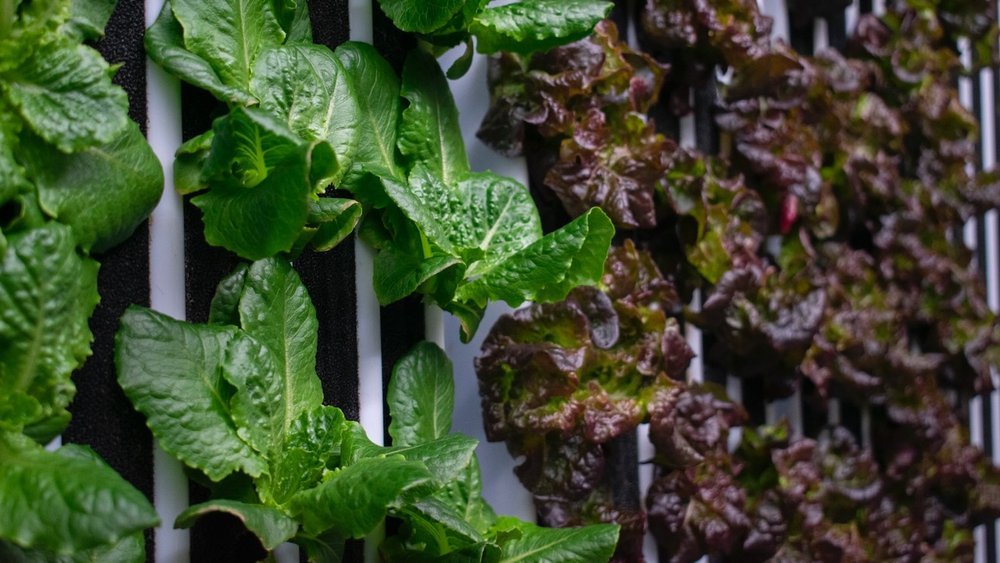See what grows in our farms
Learn all about your growing potential with our guide to crops and yields in the Greenery S. Below you’ll find a basic overview of our five main crop categories: lettuces, leafy greens, herbs, flowers, and roots.
Please keep in mind, these yields are projections and not production guarantees.
Lettuces
Grow fresh and crispy lettuce varieties like crunchy romaine, smooth butterhead, or delicate lollo rossa. As the perfect salad base, these crops are in high demand by consumers, grocers, and chefs. Below, we categorized lettuce by the number of weeks it spends in the Greenery S Cultivation Area. At 3 weeks, you get the small head at a high quantity; At 5 weeks, you get the heaviest head in the fewest numbers. Since lettuce is sold by unit or weight, choosing at which point to harvest is based on your business model.
| Variety | 3-week schedule* | 4-week schedule* | 5-week schedule* |
|---|---|---|---|
| Bibb | 1,450 heads | 990 heads | 700 heads |
| Butterhead | 1,450 heads | 990 heads | 700 heads |
| Leaf | 1,450 heads | 990 heads | 700 heads |
| Romaine | 1,450 heads | 990 heads | 700 heads |
Leafy Greens
Leafy greens like kale, Swiss chard and arugula are versatile and rich in flavor, with a high nutritional value that makes these plants staples of many cuisines. These cut-and-come-again varieties also mean less labor in the farm.
| Variety | Weekly Yields |
|---|---|
| Arugula | 127 lbs |
| Kale | 171 lbs |
| Bok Choi | 204 lbs |
Herbs
Herbs can be used to enhance the flavor of any dish with fragrant herbs like sweet basil, savory oregano, or fresh mint. Most of these crops typically grow in warm-weather climates, so year-round availability is important for at-home cooks and professional chefs looking to add sophistication to their dishes.
| Variety | Weekly Yield in a Single-Crop Farm |
|---|---|
| Basil | 124 lbs |
| Chives | 45 lbs |
| Dill | 95 lbs |
| Parsley | 109 lbs |
| Cilantro | 67 lbs |
| Mint | 100 lbs |
Why we focus on greens
We’re often asked why we designed the Greenery S with an emphasis on growing plants like lettuce, leafy greens, herbs, and roots. The answer is simple:
Greens are efficient for your operations. Most of the plants you see on our crop list are harvested in their entirety. This means that you’re maximizing the output you get from your resources: seeds, supplies, water, electricity, and labor.
For one, this efficiency makes your farm more sustainable, since you’re not “wasting” resources on growing plants that cannot be eaten in their entirely–for example, a lot of energy and water will go into growing a cucumber plant, but you will only harvest the ‘fruit’ while the vines and leaves are not consumed.
Additionally, the efficiency of these plants is good for your business. Not only are you able to harvest (and sell!) everything you grow, but greens are typically very fast growing plants, meaning more turnover in the farm.
Experimental crops
Flowers
Colorful, fragrant, and—in some instances—tasty, flowers are a wonderful addition to your Greenery S. Grow flowers to sell alongside your produce at farmers markets, or fill requests for chefs looking to add a unique flavor or pop of color to their plates.
Varieties: Calendula, Celosia, Nasturtium, Nigella, Viola, Yarrow, Zinnia
Roots
Roots are crunchy, delicious, and sweet additions to salads, or can act as stand-alone sides. Pro tip: many chefs use the leaves of root vegetables in their dishes, so growing these crops gives them two ingredients in one!
Varieties: Beets, Carrots, Bunching Onions, Radishes, Turnips, Kohlrabi
Microgreens
Microgreens, the very young seedlings of vegetables and herbs, pack a flavorful punch! They're widely flavorful, fast-growing, and quite popular, especially with chefs. And while microgreens are tiny, they sell for a high price — making them a great crop to grow in a Freight Farm. Learn more on our blog!
Varieties: Radish, Broccoli, Pea, Cabbage, Kale, Arugula, Carrot, Basil








